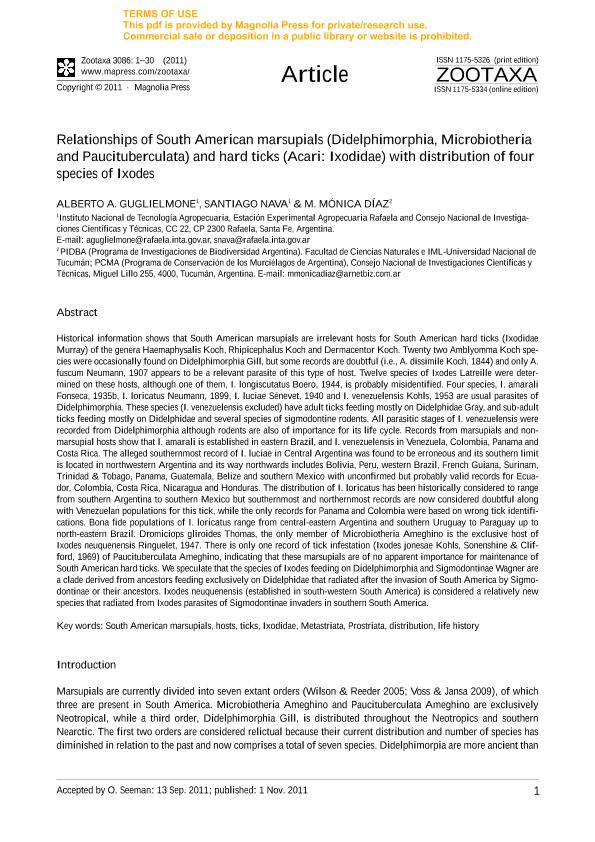Artículo
Relationships of South American marsupials (Didelphimorphia, Microbiotheria and Paucituberculata) and hard ticks (Acari: Ixodidae) with distribution of four species of Ixodes
Fecha de publicación:
11/2011
Editorial:
Magnolia Press
Revista:
Zootaxa
ISSN:
1175-5326
Idioma:
Inglés
Tipo de recurso:
Artículo publicado
Clasificación temática:
Resumen
Historical information shows that South American marsupials are irrelevant hosts for South American hard ticks (Ixodidae Murray) of the genera Haemaphysalis Koch, Rhipicephalus Koch and Dermacentor Koch. Twenty two Amblyomma Koch species were occasionally found on Didelphimorphia Gill, but some records are doubtful (i.e., A. dissimile Koch, 1844) and only A. fuscum Neumann, 1907 appears to be a relevant parasite of this type of host. Twelve species of Ixodes Latreille were determined on these hosts, although one of them, I. longiscutatus Boero, 1944, is probably misidentified. Four species, I. amarali Fonseca, 1935b, I. loricatus Neumann, 1899, I. luciae Sénevet, 1940 and I. venezuelensis Kohls, 1953 are usual parasites of Didelphimorphia. These species (I. venezuelensis excluded) have adult ticks feeding mostly on Didelphidae Gray, and sub-adult ticks feeding mostly on Didelphidae and several species of sigmodontine rodents. All parasitic stages of I. venezuelensis were recorded from Didelphimorphia although rodents are also of importance for its life cycle. Records from marsupials and nonmarsupial hosts show that I. amarali is established in eastern Brazil, and I. venezuelensis in Venezuela, Colombia, Panama and Costa Rica. The alleged southernmost record of I. luciae in Central Argentina was found to be erroneous and its southern limit is located in northwestern Argentina and its way northwards includes Bolivia, Peru, western Brazil, French Guiana, Surinam, Trinidad & Tobago, Panama, Guatemala, Belize and southern Mexico with unconfirmed but probably valid records for Ecuador, Colombia, Costa Rica, Nicaragua and Honduras. The distribution of I. loricatus has been historically considered to range from southern Argentina to southern Mexico but southernmost and northernmost records are now considered doubtful along with Venezuelan populations for this tick, while the only records for Panama and Colombia were based on wrong tick identifications. Bona fide populations of I. loricatus range from central-eastern Argentina and southern Uruguay to Paraguay up to north-eastern Brazil. Dromiciops gliroides Thomas, the only member of Microbiotheria Ameghino is the exclusive host of Ixodes neuquenensis Ringuelet, 1947. There is only one record of tick infestation (Ixodes jonesae Kohls, Sonenshine & Clifford, 1969) of Paucituberculata Ameghino, indicating that these marsupials are of no apparent importance for maintenance of South American hard ticks. We speculate that the species of Ixodes feeding on Didelphimorphia and Sigmodontinae Wagner are a clade derived from ancestors feeding exclusively on Didelphidae that radiated after the invasion of South America by Sigmodontinae or their ancestors. Ixodes neuquenensis (established in south-western South America) is considered a relatively new species that radiated from Ixodes parasites of Sigmodontinae invaders in southern South America.
Archivos asociados
Licencia
Identificadores
Colecciones
Articulos(CCT - NOA SUR)
Articulos de CTRO.CIENTIFICO TECNOL.CONICET - NOA SUR
Articulos de CTRO.CIENTIFICO TECNOL.CONICET - NOA SUR
Articulos(CCT - SANTA FE)
Articulos de CTRO.CIENTIFICO TECNOL.CONICET - SANTA FE
Articulos de CTRO.CIENTIFICO TECNOL.CONICET - SANTA FE
Citación
Guglielmone, Alberto Alejandro; Nava, Santiago; Díaz, María Mónica; Relationships of South American marsupials (Didelphimorphia, Microbiotheria and Paucituberculata) and hard ticks (Acari: Ixodidae) with distribution of four species of Ixodes; Magnolia Press; Zootaxa; 3086; 1; 11-2011; 1-30
Compartir
Altmétricas




